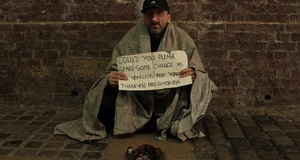Therefore, only three Caucasian men had criminal justice backgrounds comparable to those of African Americans. In comparison, they were also pressured to plead guilty, and some felt that public defenders were not in their best interest; similarly to African Americans, they had no support coming out of jail and ended up on the streets, with difficulties finding employment. It is difficult to determine whether the African American men interviewed had a tougher time as a result of the criminal background, but what is clear is that minorities are more affected by these issues and these are connected to homelessness.
It is important to note that none of the immigrants had any criminal justice backgrounds. As previously noted, immigrants did not have any direct experiences with discrimination, and they did not have issues with addictions or mental health. Many were college educated, though their education was from the country of origin. The homelessness of the immigrants interviewed was driven by lack of employment. Within this context, lack of documentation was only a driver for three of the eleven immigrants. Participant #21, a male, is an undocumented immigrant from Honduras who came to Miami in 1980, and was issued a temporary green card in 1985. He worked legal jobs in carpentry for a time period until his documents expired, after which he moved to DC and worked illegally at Home Depot. During this time period, he was able to pay for rental and motels until he had a car accident in which the other driver hit and run, resulting in a physical disability. He was no longer able to work full time, was in the hospital for a year, and has been homeless since 2006. He was not allowed to stay with his brother in Miami because the brother and his family live in public housing (interview with participant #21, June 18, 2012). Clearly, the main reason for his homelessness is lack of family support, documents to work legally, and the physical disability. Because he lacks documents, he did not receive any unemployment benefits and he is not able to receive disability benefits from the government. He currently has a free immigration lawyer (interview with participant #21, June 18, 2012).
Participant #24 is another undocumented immigrant who emigrated from Sierra Leone in 1982. He is fifty two years old and unemployed at the time of the interview, though he had periods of working while homeless for day labor jobs or dishwashing in restaurants. Before becoming homeless, he stayed with friends and later rented a place for a short period of time. He was able to get a DC ID because he had a fake social security number. He is not currently receiving any benefits and does not understand why he was terminated from health care. Participant #24 has an immigration lawyer but does not feel the lawyer is helpful; he also stated that “I have no money…I’m unaware of the system” (interview with participant #24, June 28, 2012).
The third undocumented immigrant is also a male. Participant #25 is a forty-three years old immigrant from Argentina who has been in the United States for twelve years. He was initially documented as he came on a work visa but it expired when he was laid off. He lost his apartment a few months after losing the job. He did not have much money saved up because he was sending remittances to Argentina. Just as the two other undocumented persons, participant #25 is not receiving any welfare benefits or health care (interview with participant #25, July 10, 2012).
Documented immigrants were also less likely to receive welfare benefits than African Americans or Caucasians; only five documented immigrants had benefits while all of the other groups expressed that they were receiving benefits. This is also because some documented immigrants lacked information, were confused and intimidated by the application process, or were not interested (interview with participant #19, June 18, 2012). For example, participant #18 believed that the type of green card he has does not make him eligible for benefits. He is legally blind and is not allowed to drive. He came to the United States from Ethiopia in 2010 with the visa lottery program, which issues permanent green cards. He originally came to DC and stayed with friends, then was legally employed at a chicken farm in North Carolina but the contract ended. He moved back to DC but was not accepted to stay with his friend, and is unemployed and looking. He has no family in the United States, has difficulties getting around (interview with participant #18, June 13, 2012). The main reason for his homelessness is mainly lack of employment (interview with participant #18, June 13, 2012).
Even though most of the immigrants interviewed were documented, their vulnerabilities were similar to the undocumented. All the immigrants had been in the United States for years but felt estranged and found it difficult to reach stability financially. Remittances and supporting family back home seemed to be an important factor. For example, participant #22 immigrated to the United States in 1979 as a political prisoner from Cuba, with legal documents. He moved to DC in 2002 after no longer being able to find a job in Miami. Since he has been in DC, he has lived in the shelter while working part time at Safeway and sending money to his family in Cuba (interview with participant #22, June 18, 2012). Participant #23 immigrated to the United States from Russia in 1999 legally, and was self-employed as a full time driver. When his wife fell ill, they moved to DC to be able to visit a cancer center. They did not have enough money to rent a place, so him and his wife are staying at different shelters (interview with participant #23, June 18, 2012).
Table 9. Interview-based research results as compared to the study hypotheses
|
Hypotheses
|
Interview-informed research results
|
|
1a. Exclusion of undocumented immigrants
|
Supported -both in Europe and the United States
|
| 1b. Direct discrimination in the housing market plays a much stronger role in Europe than in the United States |
Supported
|
|
2. Individual vulnerabilities
|
Not Supported
-the majority did not have mental or addiction issues, though a significant amount did
-immigrants were less likely to have individual vulnerabilities
-Caucasians were more likely to have physical disabilities or mental issues
|
|
3. Low job skills and education hindering access to employment coupled with lack of affordable housing and education; lack of family support
|
Supported
-although most participants had some college and technical skills training, these are no longer enough to succeed in the economy
-all of the women interviewed were single; for black men, this intersected with time in prisons;
-most did not access family for help, reflecting culture of
individualism and destruction of the nuclear family
|
|
4. Categorically defined differences in the experience of homelessness; markers of durable inequality, social exclusion, and discrimination present
|
Supported
-approximately half of African Americans experienced discrimination
-examples of opportunity hoarding and exploitation present
-African American males and discrimination in the criminal justice system
|
Therefore, with regards to the hypothesis that markers of categorical inequality, social exclusion, and direct or indirect discrimination are evident in the experience of homelessness of immigrants and African Americans, results show support. However, from the interviews it cannot be concluded that parents of African Americans were less likely to own a home or that discriminatory lending and foreclosures affected a significant number of African American participants. It was supported African Americans experienced discrimination, which in some cases led to loss of employment. In addition, most African American males had a criminal background and had racially motivated negative experiences with the system. The interviews support the life course hypothesis, and a link was found between incarceration and homelessness; although some Caucasians had such backgrounds, this disproportionately affected blacks. None of the immigrants had criminal backgrounds, addictions, or mental illnesses, and only 27% were undocumented. However, just as was the case with mental illness, it must be noted that other undocumented immigrants might not have wanted to participate in the interviews because of fear. The main reason for immigrant homelessness was lack of support and employment; there was not much difference between the experiences of the undocumented and documented, only that the undocumented were ineligible for welfare benefits.Continued on Next Page »
Axelson, Leland J., and Paula W. Dail. 1988. “The Changing Character of Homelessness in the United States.” Family Relations 37: 463-469.
Bessant, Judith, Richard Hil and Rob Watts. 2003. “Discovering” Risk: Social Research and Policy Making. New York: Peter Lang.
Brent, Benda B., and Elizabeth D. Hutchinson. 1990. Homelessness and Alcohol. In Helping the Homeless: Where Do We Go from Here? ed. John R. Belcher and Frederick A. DiBlasio, 123-149. Lexington, Massachusetts/Toronto: Lexington Books.
Broin, Eoin O. 2008. “Can We End Long Term Homelessness By 2010?” Homeless in Europe Winter: 10-12.
Calavita, Kitty. 2005. Immigrants at the Margins: Law, Race, and Exclusion in Southern Europe. Cambridge: Cambridge University Press.
Council of Europe. European Committee of Social Rights. 2012. “Conclusions XIX-4, United Kingdom.”
Council of Europe. European Committee of Social Rights. 2012. “ Conclusions 2011-France.”
Council of Europe. European Committee of Social Rights. 2011. “Conclusions 2011-Italy”
Donnelly, Jack. 2003. Universal Human Rights in Theory and Practice. Ithaca and London: Cornell University Press
Duffield, Barbara. 2001. Poverty Amidst Plenty: Homelessness in the United States. In International Perspectives on Homelessness, ed. Valerie Polakow and Cindy Guillean, 195-215. Westport: Greenwood Press.
Edgar, Bill, et al. 2004. Immigration and Homelessness in Europe. Bristol: The Policy Press.
Edgar, Bill. 2009. “European Review of Statistics on Homelessness.” European Observatory on Homelessness.
European Commission Against Racism and Intolerance. 2010. “ECRI Report on the United Kingdom” < http://www.coe.int/t/dghl/monitoring/ecri/Country-by- country/United_Kingdom/GBR-CbC-IV-2010-004-ENG.pdf>
European Commission Against Racism and Intolerance. 2010. “ECRI Report on France” .
Feantsa.org. 2007. “France Adopts Justiciable Right to Housing.”
Fernandez, Manny. 2007. “Study Finds Disparities in Mortgages by Race.” New York Times <http://www.nytimes.com/2007/10/15/nyregion/15subprime.html?ex=1350187200&en=a9978e04a9864642&ei=5088&partner=rssnyt&emc=rss>
Fernandez, Guillem, and Marc Uhry. 2008. “The Housing Crisis and Homelessness.” Homeless in Europe Winter: 1-5.
Fitzpatrick, Suzanne, and Beth Wattz. 2010. “’The Right to Housing’ for Homeless People.” Homelessness Research in Europe.
Gauci, Jean-Pierre. 2011. Racism in Europe: ENAR Shadow Report 2010-2011. Brussels: European Network Against Racism.
Genzuk, Michael. 2003 “A Synthesis of Ethnographic Research.” Center for Multilingual, Multicultural Research. University of Southern California < http://www- bcf.usc.edu/~genzuk/Ethnographic_Research.html>.
Glasser, Irene. 1994. Homelessness in Global Perspective. New York: Macmillan Publishing Company.
Hope, Marjorie, and James Young. 1986. The Faces of Homelessness. Lexington: Lexington Books.
Hopper, Kim. 1991. “Research for What? Lessons From the Study of Homelessness.” Bulletin of the American Academy of Arts and Sciences 44:13-31.
Husain, Altaf. 2012. Interview by author. Washington, DC. June 21.
Marcuse, Peter. 1996. Space and Race in the Post-Fordist City: the Outcast Ghetto and Advanced Homelessness in the Advanced World Today. In Urban Poverty and the Underclass, ed. Enzo Mingione, 3-41. Oxford: Blackwell Publishers.
Migration Policy Institute. 2009. “United Kingdom: A Reluctant Country of Immigration.” Migration Information Source.
Mingione, Enzo. 1996. Urban Poverty in the Advanced Industrial World: Concepts, Analysis, and Debates. In Urban Poverty and the Underclass, ed. Enzo Mingione, 3-41. Oxford: Blackwell Publishers.
Mondloch, Kevin. 2012. Interview by author. Arlington, VA. July 9
National Alliance to End Homelessness. 2012. “The State of Homelessness in America: 2012.” Homelessness Research Institute.
National Coalition for the Homeless. 2009. “Foreclosure to Homelessness 2009.” www.nationalhomeless.org
National Coalition for the Homeless. 2009. How Many People Experience Homelessness?” http://www.nationalhomeless.org/factsheets/How_Many.html
Office of the High Commissioner for Human Rights. 2012. The International Covenant on Civil and Political Rights < http://www2.ohchr.org/english/law/ccpr.htm>.
Office of the High Commissioner for Human Rights. 2012. The International Covenant on Economic, Social, and Cultural Rights < http://www2.ohchr.org/english/law/cescr.htm>.
Pager, Devah. 2003. “The Mark of a Criminal Record.” The American Journal of Sociology 108 No.5: 937-975.
Pettit, Becky, and Bruce Western. 2004. “Mass Imprisonment and the Life Course: Race and Class Inequality in U.S. Incarceration.” American Sociological Review 69 No.2: 151-169.
Pleace, Nicholas. 2010. “Immigration and Homelessness.” Homelessness Research in Europe. Centre for Housing Policy, University of York.
Rosenheck, Robert, Ellen Bassuk and Amy Salomon. 1998. “Special Populations of Homeless Americans.” U.S. Department of Health and Human Services < http://aspe.hhs.gov/progsys/homeless/symposium/2-Spclpop.htm>
Shelter.org. 2012. Temporary Accommodation from the Council.
Shelter.org. 2011. “Am I Eligible for Assistance?”
Shinn, Marybeth. 2010. “Homelessness, Poverty, and Social Exclusion in the United States and Europe.” European Journal of Homelessness 4: 19-44.
Simon, Rita, and James Lynch. 1999. “A Comparative Assessment of Public Opinion toward Immigrants and Immigration Policies.” International Migration Review 33 no.2.
Substance Abuse and Mental Health Services Administration. 2012. Homelessness Resource Center. Homeless Populations
Substance Abuse and Mental Health Services Administration. 2011. “Current Statistics on the Prevalence and Characteristics of People Experiencing Homelessness in the United States.”
Susser, I. 1996. “The Construction of Poverty and Homelessness in U.S. Cities.” Annual Review of Anthropology 25: 411-435.
Tilly, Charles. 1999. Durable Inequality. Berkley; Los Angeles; London: University of California Press.
Toro, Paul A., et al. 2007. “Homelessness in Europe and the United States: A Comparison of Prevalence and Public Opinion.” Journal of Social Issues 63: 505-524.
U.S. Department of Housing and Urban Development. “The 2010 Annual Homeless Assessment Report to Congress.” June 2011.
U.S. Department of State. 2011. Bureau of Democracy, Human Rights, and Labor. Country Reports on Human Rights Practices for 2011. Italy
Wacquant, Loic J.D, and William Julius Wilson. 1989. “The Cost of Racial and Class Exclusion in the Inner-City.” The Ghetto Underclass: Social Science Perspectives 501, 8-25.
Wacquant, Loic J.D. 1996. “The Rise of Advanced Marginality: Notes on its Nature and Implications.” Acta Sociologica 39 no.2, 121-139.
Washington.org. 2012. “DC History.” Accessed July 13. http://www.washington.org/visiting/experience-dc/knowledge-seeker/dc-history-african- american
Wright, Talmadge. 2000. “Resisting Homelessness: Global, National, and Local Solutions.” Contemporary Sociology 29: 27-43.
1.) In the United Kingdom, statutory homeless are people that have a legal claim to housing as considered by the legal authorities. In order to be eligible, one must lack a secure place to live, must have dependent children, apply for homelessness assistance, prove unintentional homelessness, and must pass a series of tests (CRISIS, Statutory Homelessness, 2012. http://www.crisis.org.uk/pages/homeless-def-numbers.html#_ftn).
2.) This research was approved by the Institutional Research Board in the spring semester of 2012.
3.) Names of some participants are being kept confidential.



















